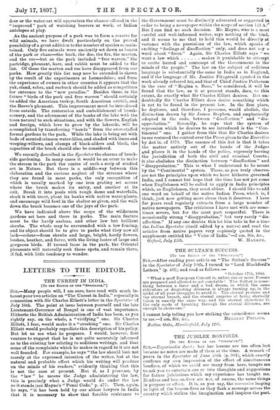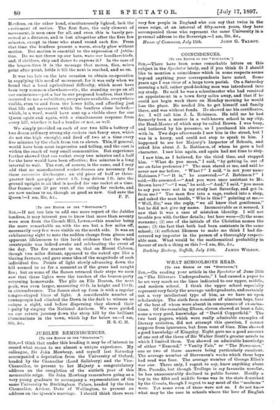THE JUBILEE BONFIRES.
[To TH8 EDITOR OF TH8 "SPECT•TOR."] SIlt,—Experientia docet ; but her lessons are too often lost because no notes are made of them at the time. A remark of yours in the Spectator of June 26th (p. 901), which exactly confirms my own impression of the effect of simultaneous bonfires, of which we could see many from here, tempts me to ask you to entertain one or two thoughts and suggestions for future jubilations which my experience has taught me. Bonfires and beacon-fires are not, of course, the same things in purpose or effect. It is, as you say, the successive leaping to light of the beacon-fires as they flash a message across the country which strikes the imagination and inspires the poet.
Bonfires, on the other band, simultaneously lighted, lack the excitement of motion. The first flare, the only element of movement, is seen once for all, and even this is barely per- ceived at a distance, and is lost altogether after the first few minutes, except to those who stand round each fire. From that time the bonfires present a warm, steady glow without motion. But motion is essential to the expression of jubila- tion. Do we not throw up our hats, wave our handkerchiefs. and, if children, skip and dance to express it ? In the case of the beacon.fires it is the message that moves, flies, seizes point after point, holds it till the next is reached, and so on.
It was too late on the late occasion to obtain co-operation in supplying this need of movement, for it was only when we found that a local agricultural difficulty, which must have been very common elsewhere—viz., the standing crops on all our eminences—put a bar to our proposed bonfires, that there occurred to me a substitute, everywhere available, everywhere visible, even to and from the lower hills, and affording just that life and movement which the bonfires alone lacked,— which, in a word, would have sent up a visible cheer for our Queen again and again, with a simultaneous response from every hill, whether it had a bonfire or not, as well.
We simply provided on each of our two hills a battery of two dozen ordinary strong sky-rockets (not fancy ones, which do not rise high enough), and fired off two at a time every five minutes by the clock from ten to eleven. This, if general, would have been most impressive and telling, and the cost is within the reach of very small communities. But experience further showed that one rocket every two minutes and a half for the hour would have been effective; five minutes is a long interval to wait. The cost, of course, is the same, and I may add that no manufactured rocket-frames are necessary for these successive discharges ; an old piece of half or three- quarter inch gas-pipe about 4 ft. long driven 1 ft. into the ground upright is all that is needed for one rocket at a time. Our frames cost 20 per cent, of the outlay for rockets, and are now useless to us, though as good as new. God save the Queen !—I am, Sir, &c., F. P.
[To THE EDITOR OF THE " SPECTATOR"] Six,—If not too late to add one more report of the Jubilee bonfires, it may interest you to know that more than seventy were seen from the Coomb Hill, Lewes,—this number being the more remarkable as, with the sea but a few miles off, necessarily very few were visible on the south side. It was an exhilarating sight to note the sudden change from gloom and apparent lifelessness to this lurid evidence that the whole 3ountryside was indeed awake and celebrating the event of the day. The fire nearest to us, that on Mount Caburn, though two miles distant, appeared to the naked eye like a blazing furnace, and gave some idea of the magnitude of each individual fire. Points of light slowly advancing down the hill seemed to us for a moment as if the grass had caught fire ; but as some of the flames retraced their steps we soon saw that these lights were the torches of the beacon-party returning homewards. The pile on File Beacon, the next peak, was even larger, measuring GO ft. in height and 150 ft. in circumference. The flames shot up from it with a regular tongue-shaped blaze of light. A considerable number of townspeople had climbed the Down in the dark to witness so unique a sight, and before dispersing they showed their loyalty by singing the National Anthem. We were guided on our return journey down the steep hill by the brilliant illuminations in the town, which lay far below us.—I am,
Sir, &c., H. S. C. H.



































 Previous page
Previous page